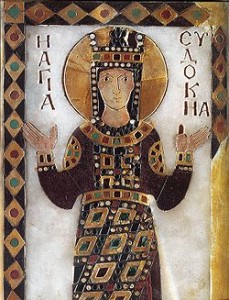Perpetua of Carthage, martyr, d. 203
She wrote Perpetua’s Diary, the powerful record of her conversion to Christianity and her subsequent death in the arena. Perpetua’s Diary is the oldest extant document we know was written by a woman. Her story was so popular that it was told throughout the Mediterranean world in the 3rd through 6th centuries. Later Christian writers (for instance, St. Augustine) would ask, “Why was this woman’s story told when there were also male martyrs in Carthage?” (This mosaic was created in Ravenna, c 494)
Proba Betitia Faltonia, teacher, c 310 – c 360
She wrote the Cento, Vergilianus de laudibus Christi, through which she told the stories of the Bible from the Creation to the coming of the Holy Spirit. The Cento was well-known in the Roman world of the 4th century; her interpretation of Jesus nade him classical hero like Aeneas. How did Proba do it? (This is the question to ask every time a woman succeeded in these centuries.) Proba came from an aristocratic family, and because of her father’s permission received a classical education. Her work was criticized by St. Jerome, not a friend of women, who called her garrulous and unaware of scriptural meanings; by the 5th c the pope said her work was not to be read in public. Nevertheless her work was a a favorite teaching tool until late Middle Ages. (This 15th c. Italian manuscript shows Proba teaching.)
Egeria of Galicia, pilgrim and writer, c 380
She wrote Itinerarium Egeriae, or Travels of Egeria. This journal, kept during her three-year stay in the Holy Land, meticulously recorded the details of the Eastern Christian liturgies of Jerusalem. Western Christians were eager to adopt liturgies like those used in the Holy Land, and Egeria’s journal was re-copied many times and circulated throughout Europe, providing the basis for western Christian liturgies in Holy Week and Easter. (Spanish stamp, 1964)

Eudocia, Byzantine empress and writer, c. 401–460
She wrote the Martyrdom of St. Cyprian along with many other works. Eudokia’s poetry and essays reveal the blending of early Christian teaching and Hellenistic philosophy in the Greco-Roman world. Like Proba, Eudokia was given a classical education by her patrician father. (Stone inlay on marble from Lips monastery, Istanbul)



